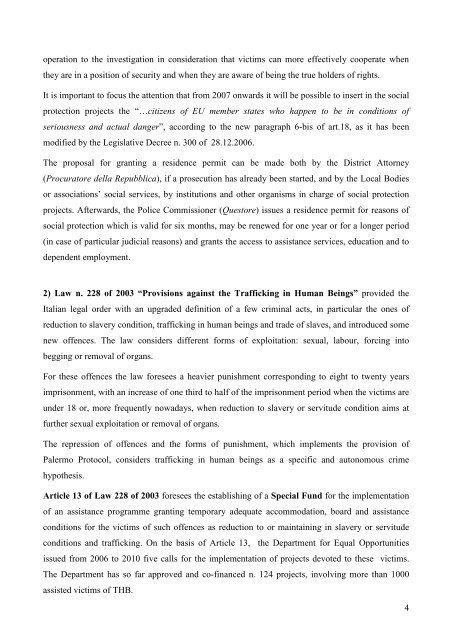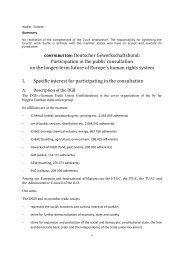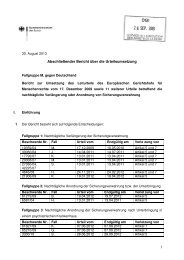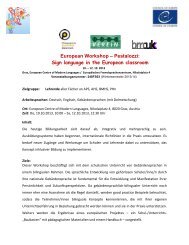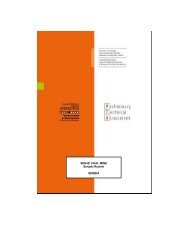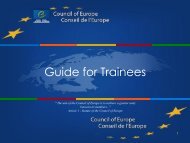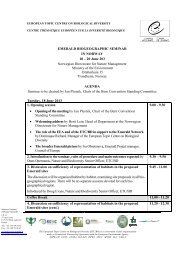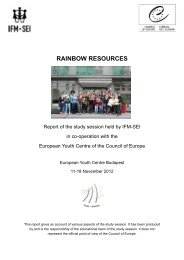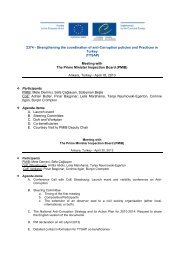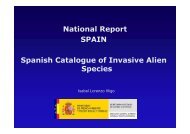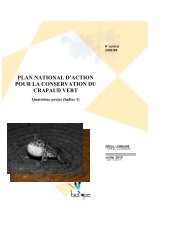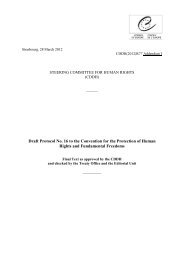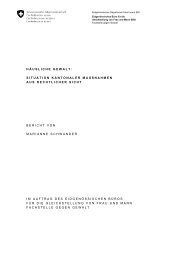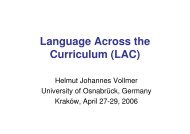QUADRI - Presentation Italy - Valerie Quadri - Council of Europe
QUADRI - Presentation Italy - Valerie Quadri - Council of Europe
QUADRI - Presentation Italy - Valerie Quadri - Council of Europe
You also want an ePaper? Increase the reach of your titles
YUMPU automatically turns print PDFs into web optimized ePapers that Google loves.
operation to the investigation in consideration that victims can more effectively cooperate when<br />
they are in a position <strong>of</strong> security and when they are aware <strong>of</strong> being the true holders <strong>of</strong> rights.<br />
It is important to focus the attention that from 2007 onwards it will be possible to insert in the social<br />
protection projects the “…citizens <strong>of</strong> EU member states who happen to be in conditions <strong>of</strong><br />
seriousness and actual danger”, according to the new paragraph 6-bis <strong>of</strong> art.18, as it has been<br />
modified by the Legislative Decree n. 300 <strong>of</strong> 28.12.2006.<br />
The proposal for granting a residence permit can be made both by the District Attorney<br />
(Procuratore della Repubblica), if a prosecution has already been started, and by the Local Bodies<br />
or associations’ social services, by institutions and other organisms in charge <strong>of</strong> social protection<br />
projects. Afterwards, the Police Commissioner (Questore) issues a residence permit for reasons <strong>of</strong><br />
social protection which is valid for six months, may be renewed for one year or for a longer period<br />
(in case <strong>of</strong> particular judicial reasons) and grants the access to assistance services, education and to<br />
dependent employment.<br />
2) Law n. 228 <strong>of</strong> 2003 “Provisions against the Trafficking in Human Beings” provided the<br />
Italian legal order with an upgraded definition <strong>of</strong> a few criminal acts, in particular the ones <strong>of</strong><br />
reduction to slavery condition, trafficking in human beings and trade <strong>of</strong> slaves, and introduced some<br />
new <strong>of</strong>fences. The law considers different forms <strong>of</strong> exploitation: sexual, labour, forcing into<br />
begging or removal <strong>of</strong> organs.<br />
For these <strong>of</strong>fences the law foresees a heavier punishment corresponding to eight to twenty years<br />
imprisonment, with an increase <strong>of</strong> one third to half <strong>of</strong> the imprisonment period when the victims are<br />
under 18 or, more frequently nowadays, when reduction to slavery or servitude condition aims at<br />
further sexual exploitation or removal <strong>of</strong> organs.<br />
The repression <strong>of</strong> <strong>of</strong>fences and the forms <strong>of</strong> punishment, which implements the provision <strong>of</strong><br />
Palermo Protocol, considers trafficking in human beings as a specific and autonomous crime<br />
hypothesis.<br />
Article 13 <strong>of</strong> Law 228 <strong>of</strong> 2003 foresees the establishing <strong>of</strong> a Special Fund for the implementation<br />
<strong>of</strong> an assistance programme granting temporary adequate accommodation, board and assistance<br />
conditions for the victims <strong>of</strong> such <strong>of</strong>fences as reduction to or maintaining in slavery or servitude<br />
conditions and trafficking. On the basis <strong>of</strong> Article 13, the Department for Equal Opportunities<br />
issued from 2006 to 2010 five calls for the implementation <strong>of</strong> projects devoted to these victims.<br />
The Department has so far approved and co-financed n. 124 projects, involving more than 1000<br />
assisted victims <strong>of</strong> THB.<br />
4


